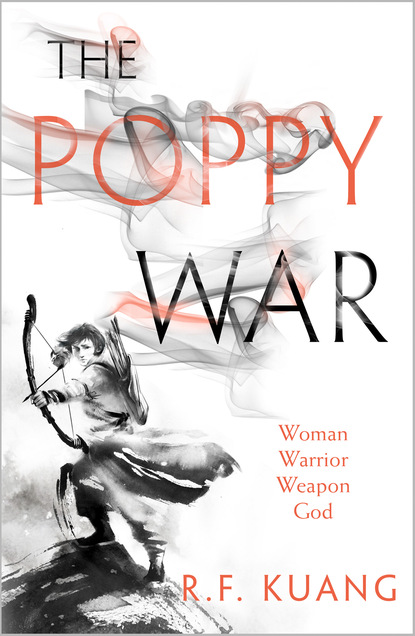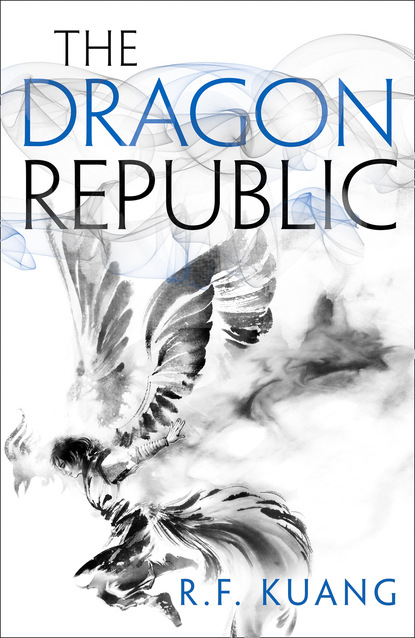
Полная версия
The Burning God
“General?” the scout asked quietly.
Rin blinked. She’d been staring after Venka’s retreating figure. “Give me a moment. I’ll meet you at the east gate.”
She returned to the general’s complex to change her boots and ask around the barracks until someone lent her a spare shovel. Then she followed the scout to the killing fields.
The walk was shorter than she expected.
She knew the site from a quarter-mile off. She knew it from the smell, the rancid odor of decay under a thin sheen of dust; from the fat insects scurrying into the ground and the carrion birds that perched casually on white bone fragments sticking out of the ground. She knew it from the discolored and displaced soil, and the traces of hair and clothes strewn across the dirt where the Mugenese had hardly bothered to bury them.
She stopped ten feet before she reached the graves. She needed to breathe before she could bring herself to go any farther.
“Let someone else do this.” Kitay put a hand on her shoulder. “You’re allowed to go back.”
“I’m not,” she said. “And I can’t. This has to be me.”
It had to be her because this was her fault. She was obligated to look. She needed to afford the dead at least that modicum of respect.
She wanted to bury it all, to pile mounds of soil over this shallow grave, tamp it tightly against the ground with shovels, and then roll wagons over it to flatten this site so that it might fade back into the landscape until one day they could pretend it had never existed.
But they had to identify the bodies. So many southerners were currently trapped in that horrifying limbo of uncertainty with no way to know if their loved ones were dead, and that uncertainty could hurt more than grief. Once they found the bodies, at least they could mourn.
And then, because burial rituals were so important in the south, the bodies needed to be cleaned. In peacetime, funerals in Tikany were daylong affairs. Hordes of mourners—sometimes including hired professionals to inflate the ranks, if the deceased’s family could afford it—moaned and wailed as they followed the coffin out of town to carefully prepared ancestral plots. The souls of the dead needed to be properly coaxed into their graves so they would rest instead of haunting the living; this demanded regular offerings of burned paper goods and incense to soothe them into the world beyond.
Rin had an idea of what the afterlife looked like now. She knew it was not some cute parallel ghost city where burned paper offerings might be translated into real treasures. But still, to leave a loved one’s body to rot in the open was shameful.
She’d thrown away most of her Rooster heritage. She’d lost her dialect and her mannerisms; since her first year at school, she’d dressed and spoken like a Sinegardian elite. She didn’t believe in southern superstition, and she wasn’t going to start pretending now.
But death was sacred. Death demanded respect.
Kitay had taken on the gray-green pallor of someone about to vomit.
She reached for his shovel. “You don’t need to stay if you can’t. These aren’t your people.”
“We’re bound.” He pulled his shovel back from her grasp and gave her a wan, exhausted smile. “Your pain will always be mine.”
Together they began to dig.
It wasn’t difficult. The Mugenese had covered their handiwork with only a thin layer of soil, barely enough to conceal the tangled mass of limbs underneath. Whenever Rin had uncovered enough dirt to reveal the top layer of a corpse, she stopped and moved on, not wanting to break apart the already soft, decomposing bodies.
“In the north, we burn our dead,” Kitay said after an hour. He reached up to wipe the sweat off his forehead, leaving behind a streak of mud. “It’s cleaner.”
“So we’re vulgar,” Rin said. “So what?”
She didn’t have the energy to defend what they were doing. Earthen burial was the oldest of southern rituals. The Roosters were people of the earth, and their bodies and souls belonged in the ground—ancestral land that was marked, possessed, inhabited by generations stretching back as long as the history of the province. So what if that made them the Empire’s mud-skinned refuse? The earth was permanent, unforgiving. The earth would rise up and swallow its invaders whole.
“They won’t be able to recognize half these bodies,” Kitay said. “They’re too far decomposed, look—”
“They still have their clothes. Jewelry. Hair. Teeth. They’ll find them.”
They kept digging. No matter how many faces they uncovered, the shallow graves seemed to stretch on without end.
“Are you looking for someone?” Kitay asked after a while.
“No,” Rin said.
She meant it. She had briefly considered searching for Tutor Feyrik. She’d tried to think of the distinct markers that might identify him. His height and build were too average. She could have searched for his beard, perhaps—but there were hundreds of old men in Tikany with beards just like his. His clothes had always been nondescript; perhaps he might have his lucky gambling dice in his front pocket, but Rin couldn’t bear the thought of walking down the lines, ramming her hand down every bearded corpse’s pocket to verify someone had already died.
She was never going to see Tutor Feyrik again. She already knew that.
Hours later, Rin at last called for a stop. They’d been digging for three hours. The sun drooped low in the sky; soon, it would be too dark to tell whether their shovel blades were hitting soil or flesh.
“Back to the village,” she rasped. She desperately needed a drink of water. “We’ll return tomorrow when the sun’s come up—”
“Hold on,” called a soldier farther down the path. “Something’s moving over here.”
At first Rin thought the slight movement she saw was a trick of light glinting against buried metal, or perhaps a lone vulture pecking at carrion. Then she drew closer and saw it was a hand—a scrawny hand forced through a gap in the pile of bodies, waving ever so faintly.
Her troops hastened to drag the corpses out of the way. Six bodies removed finally revealed the owner of the hand—a thin, coughing boy covered entirely in dried blood.
He was still conscious when they pulled him out of the grave. He blinked up at them, dazed. Then his eyes closed, and his head slumped to the side.
Rin sent a runner into the township for a physician. Meanwhile, they laid the boy out on the grass and wiped away the blood and dirt caked to his skin as best they could using water from their canteens. Rin watched the boy’s chest throughout—it was bloody and discolored, caked over with dried blood and bruises, but still it rose and fell in a steady, determined rhythm.
When a physician arrived and cleaned the boy’s torso with alcohol, they learned that the source of the blood wasn’t deep—the wound was just a cut about two inches deep into his left shoulder. Enough to agonize but not to kill. The dirt had acted as a poultice, stemming a tide of blood that would have killed him otherwise.
“Hold him tight,” said the physician. He uncorked a bottle of rice wine and tipped it over the wound.
The boy jerked awake, hissing in pain. His eyes fluttered open and locked on Rin’s.
“You’re okay,” she said as she pinned his arms against the ground. “You’re alive. Be brave.”
His eyes bulged. A vein pulsed in his clenched jaw as he writhed under their hands, but never once did he scream.
He couldn’t have survived out here for more than a few days. The infection, and lack of water, would have killed him if it had been any longer than that. That meant the killing fields were fresh. The Mugenese had slaughtered them just days before the Southern Army arrived.
Rin tried to figure out what that meant.
Why would you mass-slaughter a town just before another army arrived?
To make Rin’s victory shallow? To spit venom at an army they knew they couldn’t beat? To leave one last, cruel message?
No. Gods, no, please, that could not be the truth.
But she couldn’t think of any other rationale. Blood rushed to her temples as she watched the boy’s eyes roll into the back of his head. She was afraid to stand; she thought she, too, might faint.
You did this, taunted the burial fields. You made us kill them. We would have left this town alone unless you came, but you did, and so all this is your fault.
Rin sent her soldiers back to the township ahead of her. She hung back, waiting for the sun to set. She wanted a few minutes of silence. She wanted to stand alone with the graves.
“There’s nothing left alive here,” Kitay said. “Let’s go.”
“You go,” she said. “I’ll be right behind you.”
He paused in his steps. “Will this make you feel better?”
He didn’t elaborate, but she knew what he meant. “Don’t suggest that.”
“But I’m right,” he pressed. “It makes it easier.”
She couldn’t deny that. He knew what she couldn’t admit out loud; he could read her mind like an open book.
“Please,” she said. “Just let me have this. Please just go.”
He knew better than to argue. He nodded, squeezed her hand, and left with the others.
Kitay was right. He knew what kind of absolution she sought from the killing fields. He knew that she needed to stay because if she seared the sight of what the Mugenese had done into her eyes, if she breathed the scent of half-rotted corpses, if she reminded herself why she had a reason to hate and keep hating, then it became easier to come to terms with what she had done to the longbow island.
It didn’t matter how shrill the screams of dying Mugenese boys sounded in her dreams. They were still monsters, heartless things who deserved everything she had ever done and would ever do to them.
That had to be her truth, or she would shatter.
She didn’t know how long she stood there. But when she finally moved to return to camp, the sun had disappeared entirely, and the uncovered graves had seared such a deep impression in her mind that every detail would remain forever. The arrangement of bones. How they curved and arched around one another. How they shone under the last rays of the dying sun.
You won’t forget, assured Altan. I won’t let you.
She pressed her eyes shut, took a deep breath, then turned back toward the village.
She made it two steps before she froze. Something gave her pause. She squinted at the trees. Yes—there it was, the flash of motion that had caught her eye the first time. Someone was running into the forest.
Rin dug her heels into the ground and gave chase.
“Hold it!”
She crashed through the trees, arms backlit with flame, casting hot light on the darkness all around her.
Then she stumbled to a halt. Her target had stopped—it wasn’t a soldier or spy but a little girl, crouched at the bottom of a shallow ravine, arms wrapped around her legs and head ducked down while her lips moved like she was counting numbers.
Someone had taught her to do this. Someone had drilled her in it. Rin had been taught the very same lesson as a little girl—if they are chasing you, if you cannot outrun them, find somewhere to hide and count until they’ve gone away.
“Hey.” She approached slowly, arms out, the fingers of her left hand splayed out in what she hoped was a nonthreatening gesture. “It’s okay.”
The girl shook her head and continued counting, eyes squeezed shut like if she couldn’t see Rin, then she might disappear.
“I’m not Mugenese.” Rin dragged her vowels out, trying to replicate an accent she’d long ago lost. “I’m a Rooster. One of you.”
The girl’s eyes opened. Slowly she lifted her head.
Rin stepped closer. “Are you alone?”
The girl shook her head.
“How many are you?”
“Three,” whispered the girl.
Rin saw another pair of eyes in the darkness, wide and terrified. They ducked behind a tree as soon as they caught her looking back at them.
She quickly pulled a larger ring of fire into the air around her, just enough to illuminate the clearing. It revealed two emaciated little girls staring up at her with naked fascination. Their eyes looked huge on their hollow faces.
“What are you doing?” Footsteps crashed through the thicket. Rin spun around. A third figure—the girls’ mother, or an older sister, she couldn’t tell—dashed into the clearing and reached for the girls’ wrists, dragging them away from Rin.
“Are you mad?” The woman shook the taller girl by the shoulders. “What were you thinking?”
“She was dressed in fire,” said the girl.
“What?”
The girl hadn’t stopped staring at Rin. “I wanted to look.”
“You’re in no danger,” Rin said quickly. “I’m Nikara, I’m from Tikany. I’m a Rooster. I’m here to protect you.”
But she already knew she didn’t have to explain. The woman’s eyes had widened in recognition, and she seemed to have realized, for the first time, that the flames lighting the clearing came not from a torch but from Rin’s skin.
The woman spoke in a whisper. “You’re the Speerly.”
“Yes.”
Her mouth worked for a few seconds before words came out. “Then are you—have they—”
“Yes,” Rin said. “They’re gone.”
“Truly?”
“Yes. They’re all dead. You’re safe.”
She saw no joy on the woman’s face, only a stark, stunned disbelief. Upon a closer look the woman wasn’t as old as Rin had thought. She was emaciated and terribly filthy, but beneath a thick layer of grime was the face of someone not so much older than herself.
“What are you doing in the forest?” Rin asked her.
“We ran,” said the woman. “As soon as we heard the Mugenese were coming. I’d heard what they do to Nikara women. I wasn’t going to—I mean, they weren’t—”
“They’re your sisters?”
“No,” said the woman. “Just two girls who lived in my alley. I tried to get more to come with me. They wouldn’t leave.”
“You were wise to go,” Rin said. “How have you survived all this time?”
The woman hesitated. Rin could read the lie assembling behind her eyes. The woman had an answer, she just wasn’t sure if she should speak it.
The smallest girl piped up. “The lady in the hut.”
The woman’s face tightened, which meant the girl had told the truth.
“What lady?” Rin asked.
“She protects us,” said the girl. “She knows things. She tells us when to hide and which roots we can eat and where to lay traps for birds. She said that as long as we obeyed her, then we would be safe.”
“Then she should have taken you far away from this place,” said Rin.
“She can’t. She won’t leave here.”
Rin felt a sudden, scorching suspicion of who this lady was.
“And why can’t she leave?” she asked.
“Shush,” the woman told the girl, but the girl kept speaking.
“Because she says she lost her daughter in the Dragon King’s palace, and she’s waiting for her to come back.”
Rin’s mouth filled with the taste of blood. Her knees buckled.
What is she doing here?
The woman put a tentative hand on Rin’s elbow. “Are—are you all right?”
“She’s here,” Rin murmured. The words felt thick and coppery on her tongue. “Take me to her.”
She had to go. She had no choice. She was a fly caught in a web; she was a hypnotized mouse crawling straight into a viper’s jaws. She could not walk away now, not until she knew what Su Daji wanted.
Конец ознакомительного фрагмента.
Текст предоставлен ООО «ЛитРес».
Прочитайте эту книгу целиком, купив полную легальную версию на ЛитРес.
Безопасно оплатить книгу можно банковской картой Visa, MasterCard, Maestro, со счета мобильного телефона, с платежного терминала, в салоне МТС или Связной, через PayPal, WebMoney, Яндекс.Деньги, QIWI Кошелек, бонусными картами или другим удобным Вам способом.





